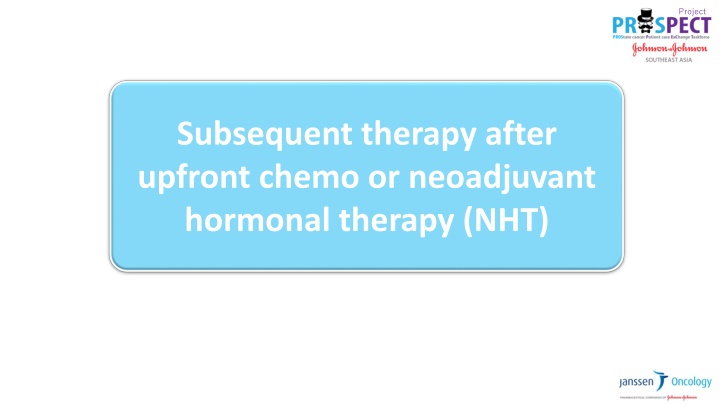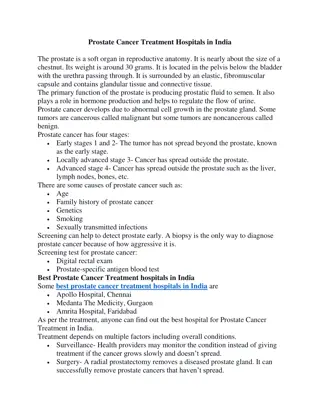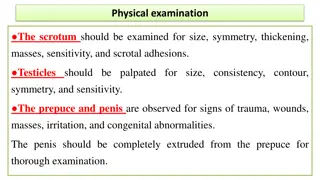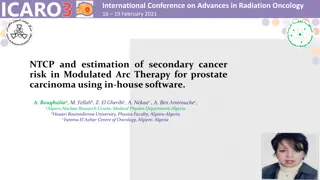Rational Management of Metastatic Castration-Resistant Prostate Cancer: Treatment Insights and Options
Experts discussed various treatment options for a 60-year-old patient with mCRPC, including switching to Lutetium therapy after progression on Apalutamide. Genetic testing, avoiding back-to-back hormonal therapies, and considering novel AR-blockers like Lutetium-PSMA and PARP inhibitors were highlighted. Panelists emphasized individualized treatment choices and the importance of genetic counseling. Clinical insights emphasized the need for more efficacy data on sequential hormonal treatments and listed different therapies for mCRPC, such as docetaxel, cabazitaxel, Ra-223, and Lutitium-177. Overall, a personalized approach with newer treatment modalities is recommended.
Download Presentation

Please find below an Image/Link to download the presentation.
The content on the website is provided AS IS for your information and personal use only. It may not be sold, licensed, or shared on other websites without obtaining consent from the author.If you encounter any issues during the download, it is possible that the publisher has removed the file from their server.
You are allowed to download the files provided on this website for personal or commercial use, subject to the condition that they are used lawfully. All files are the property of their respective owners.
The content on the website is provided AS IS for your information and personal use only. It may not be sold, licensed, or shared on other websites without obtaining consent from the author.
E N D
Presentation Transcript
Project Subsequent therapy after upfront chemo or neoadjuvant hormonal therapy (NHT)
Project Case details and discussion plan Discussion: How would you treat this patient? Patient detailing A 60-year-old case with adenocarcinoma progressing to mCRPC was discussed. Patient had hypertension and no drug allergy history. The Gleason score was 4+3=7. CT scan and RO showed pelvic lymph nodes along with multiple bone lesions. Routine investigations: PSA: 220 ng/mL ALP: 554 IU/L Patient had upfront chemotherapy and received Apalutamide and then progressed to mCRPC. Abiraterone OR Docetaxel OR Enzalutamide OR Radium-223 OR Cabazitaxel ALP: alkaline phosphatase; CT: computed tomography; mCRPC: metastatic castration-resistant prostate cancer; PSA: prostate specific antigen
Project Panelist insights Experts shared regional insights about rational management of this case and choice of treatment for such patients. All treatment options are reasonable alternatives, however one not reported is Lutetium. As the patient has already had Apalutamide, change to another AR pathway blocker will not be effective. As long as gallium scan is positive, I would consider the patient for Lutetium. The panelists agreed that: Choice of therapy depends on individual practice. Dr. Loh Chit Sin Back-to-back monotherapy agents is not a better option to treat the patient. Most patients prefer oral agents as they are convenient to use. If the patient has already received one novel AR driven agent and gets switched to other, the efficacy is limited. In my practice, we would also consider germline mutation testing. This patient has a long runway and has time to try different combinations. Germline mutation testing can also benefit the treatment procedure. For this patient, changing treatment to another AR-blocker will not be beneficial. A/Prof. Lee Lui Shiong Gallium and Lutetium, theranostic twins, are advisable for treatment. Back-to-back hormonal therapy agents is not a good option to treat the patient. After treatment with apalutamide, I would not start abiraterone because the efficacy is quite poor. Docetaxel and Radium-223 are not preferable treatments for this patient. Genetic testing will definitely be beneficial. Lutetium-PSMA and PARP inhibitors can be considered. Lutetium-PSMA and PARP inhibitors can be considered. A/Prof. Edmund Chiong A/Prof: Associate Professor; AR: androgen receptor; PSMA: prostate specific membrane antigen; PARP: poly adenosine diphosphate-ribose polymerase
Project Clinical insights There are various options to treat mCRPC as discussed by panelists and reported in the table below. However, the best option is not known so far. Olaparib is available as a precision medicine in case of BRCA1 or BRCA2 alterations. Therefore, investing in genetic counselling makes sense. In real world practice, hormone-hormone combinations is invoked. A lot of patients receive enzalutamide post abiraterone or abiraterone post apalutamide. However, regarding efficacy, more data is required. In US, most common therapies as per line are: 1L AA + prednisone, 2L Enza, 3L Docetaxel. The patient can be administered with docetaxel or cabazitaxel or Ra-223 or Lutitium-177 to switch mode of action, instead of hormone-hormone sequencing as preferred in US. VISION1 PROFound2 ALSYMPCA3 TROPIC4 AFFIRM5 Cougar 3016 CARD7 Trials/ Parameters 177Lu-PSMA-617 vs SOC Olaparib vs AA/Enza Caba vs AA/Enza Arms Ra-223 vs BSC Caba vs Mito Enza vs PBO AA vs PBO OS, months 15.3 vs 11.3 18.5 vs 15.1 14.9 vs 11.3 15.1 vs 12.7 18.4 vs 13.6 15.8 vs 11.2 13.6 vs 11 HR 0.62 0.64 0.70 0.70 0.63 0.74 0.64 1L, first line; 2L, second line; 3L, third line; AA: Abiraterone acetate; BSC: best standard care; Caba: Cabazitaxel; Enza: Enzalutamide; HR: hazard ratio; Lu- PSMA: Lutetium-Prostate-specific membrane antigen; Mito: Mitoxantrone; OS: overall survival; PBO: placebo; Ra-223: Radium-223; SOC: standard of care 1. Morris MJ, et al. Plenary session at ASCO 2021; abstract LBA4. 2. de Bono J, et al. N Engl J Med. 2020;382:2091-102. 3. Parker C, et al. N Engl J Med. 2013;369:213-23. 4. de Bono JS, et al. Lancet. 2010;376:1147-54. 5. Scher HI, et al. N Engl J Med. 2012;367:1187-97. 6. Fizazi K, et al. Lancet Oncol. 2012;13:983-92. 7. Tombal B, et al. J Clin Oncol. 2020;38 Suppl 15:5569.
Project Discussion and Conclusion PFS2: Hormonal Group2 In patients with mCRPC, germline or somatic HRR mutation testing will prove to be beneficial in the course of treatment. A lot of patients receive enzalutamide post abiraterone or abiraterone post apalutamide. However, more data is required in terms of efficacy. For this case, it will make sense to switch mode of action and go with docetaxel or cabazitaxel or Ra-223 or Lutitium-177, instead of hormone-hormone sequencing. According to Kim Chi study1, when the patient is treated with apalutamide upfront, there are less AR alterations. So, in theory abiraterone in sequence could make sense, but more clinical data is required for clarity. PFS2: Taxane Group2 Apalutamide results in risk reduction of secondary progression, regardless of choice for hormonal or taxane therapy.2 Upfront intensification is necessary with regards to better PFS and OS benefit of 14 months after therapy intensification. ADT: androgen-deprivation therapy; AR: androgen receptor; mCSPC: metastatic castration-resistant prostate cancer; OS: overall survival; PFS: progression-free survival, Ra-223: Raium-223 1. Chi K, et al. N Engl J Med. 2019;381:13 24. Chi K, et al. Poster #883P presented at ESMO 2019. 2. Agarwal N, et al. ASCO GU 2020.
Project THANK YOU!























